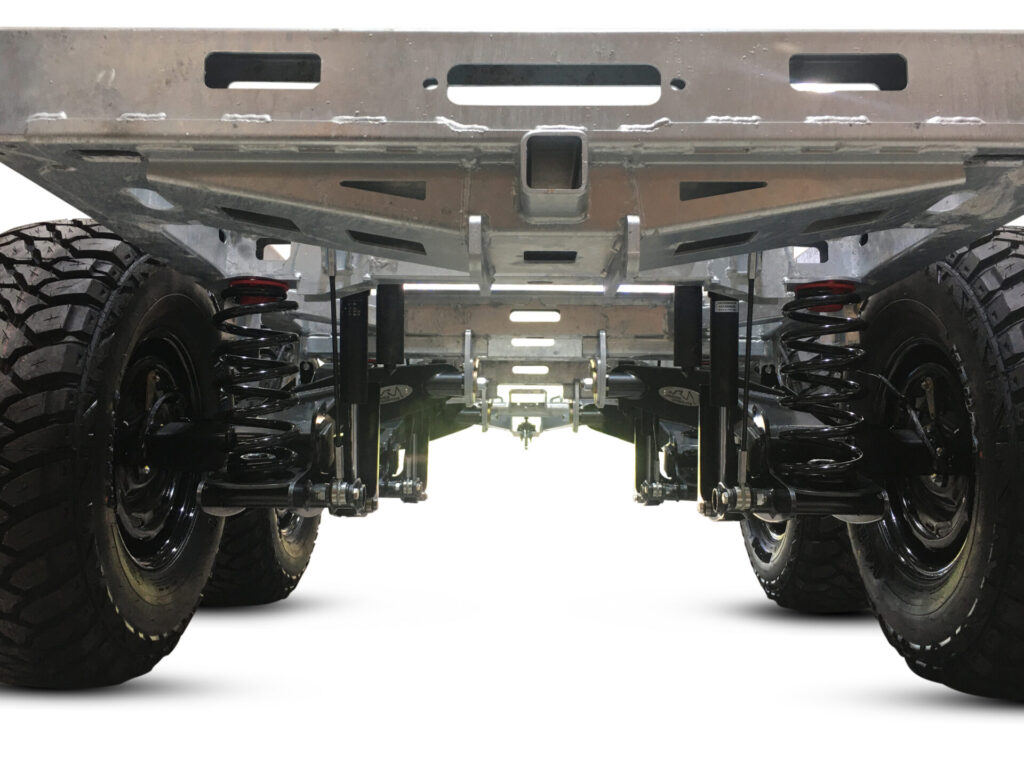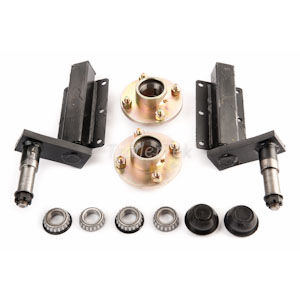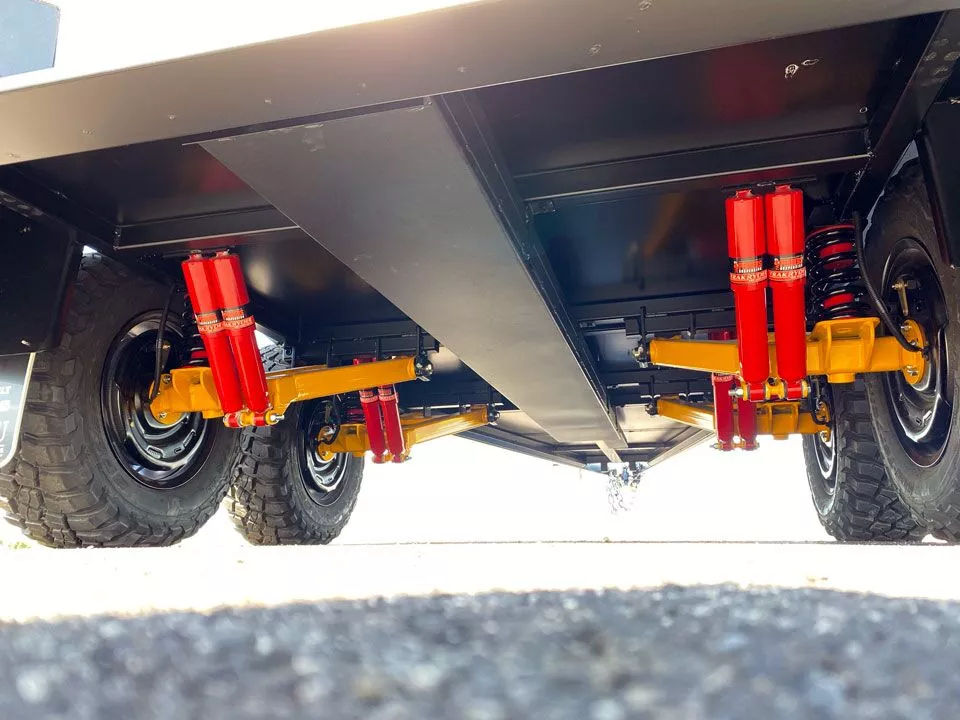Product Description
Product Description
Low Frame Bogie Suspension For Semi Trailer And Truck
| Model | ZBJZ24GNS1 | ZBJZ24GNS2 | ZBJZ28GNS1 | ZBJZ28GNS2 | ZBJZ32GNS1 | ZBJZ32GNS2 | ZBJZ36GNS1 |
| Rated loading capacity (kg) | 24000 | 24000 | 28000 | 28000 | 32000 | 32000 | 36000 |
| Leaf spring center distance (mm) | 980 | 980 | 900 | 900 | 900 | 900 | 900 |
| Height of pedestal center (mm) | 176 | 176 | 200 | 200 | 200 | 200 | 233 |
| Axle distance (mm) | 1400 | 1400 | 1550 | 1550 | 1550 | 1550 | 1550 |
| Axle model | FSA12GNS3 | FSA12GFS1 | FSA14GNS4 | FSA14GFS1 | FSA16GNS2 | FSA16GFS1 | FSA18GNS1 |
| Wheel track (mm) | 1840 | 1870 | 1850 | 1840 | 1840 | 1850 | 1850 |
| Recommended wheel | 7.50V-20 | 8.50V-24 | 8.00V-20 | 8.50V-24 | 8.50V-20 | 8.50V-24 | 8.50V-20 |
| Weight (kg) | 1725 | 1835 | 2158 | 2272 | 2235 | 2315 | 2335 |
Our factory
Packing
Trans&Delivery
| Type: | 16t |
|---|---|
| Certification: | CCC, DOT |
| ABS: | With ABS |
| Tent Type: | Simple |
| Axle Number: | 2 |
| Tire Number: | 8 |
| Customization: |
Available
|
|
|---|

Can you provide examples of trailers or towing applications that commonly use suspensions?
Yes, various trailers and towing applications commonly use suspensions to ensure optimal performance, stability, and ride comfort. Here are some examples:
- Utility Trailers:
- Recreational Trailers:
- Horse Trailers:
- Boat Trailers:
- Commercial Trailers:
Utility trailers, including flatbed trailers, enclosed trailers, and landscape trailers, often utilize suspensions. These trailers are used for a wide range of purposes such as transporting equipment, materials, or goods. Suspensions help provide a smoother ride and improved load-carrying capacity, ensuring that the trailer can handle different types of cargo and road conditions.
Recreational trailers, such as travel trailers, fifth-wheel trailers, and toy haulers, commonly incorporate suspensions. These trailers are designed for recreational purposes, including camping, road trips, and outdoor adventures. The suspensions help enhance ride comfort, stability, and handling characteristics, providing a more enjoyable towing experience for the occupants.
Horse trailers, which are specifically designed to transport horses, often utilize suspensions. These trailers typically have special features such as dividers, ramps, and ventilation systems to ensure the safety and well-being of the horses during transportation. Suspensions play a crucial role in minimizing vibrations and shocks, providing a smoother ride for the horses and reducing their stress levels.
Boat trailers are used to transport boats from one location to another, such as from a storage facility to a launch site. These trailers need to accommodate the weight and dimensions of the boat while providing stability and maneuverability on the road. Suspensions help absorb shocks and vibrations, preventing damage to the boat and ensuring a smoother towing experience.
Various types of commercial trailers, including semi-trailers, refrigerated trailers, and tanker trailers, rely on suspensions. These trailers are used in industries such as logistics, transportation, and bulk liquid hauling. Suspensions are essential to handle heavy loads, maintain stability, and ensure safe and efficient transportation of goods over long distances.
These are just a few examples, and suspensions are utilized in a wide range of other trailer types and towing applications as well. It’s important for trailer owners and operators to select the appropriate suspension system based on the specific requirements of their trailers, including load capacity, intended use, road conditions, and regulations.
In summary, suspensions are commonly used in utility trailers, recreational trailers, horse trailers, boat trailers, commercial trailers, and many other types of trailers and towing applications. The inclusion of suspensions helps improve ride quality, stability, and handling characteristics, ensuring a safe and comfortable towing experience.

Can you provide insights into the importance of proper installation and alignment of trailer suspensions?
Proper installation and alignment of trailer suspensions are critical factors that significantly impact the performance, safety, and longevity of trailers. Here are insights into their importance:
- 1. Safety: Correct installation and alignment ensure that the trailer operates safely. A properly aligned suspension system helps maintain stability during turns, reduces the risk of rollovers, and enhances overall control when towing.
- 2. Even Tire Wear: Proper alignment prevents uneven tire wear, which can lead to premature tire replacement and increased operating costs. By distributing the load evenly, alignment helps extend tire life and improves fuel efficiency.
- 3. Handling and Maneuverability: Accurate alignment enhances the trailer’s handling and maneuverability. It allows for smoother turns and better response to steering inputs, making it easier for the driver to control the trailer, especially in tight spaces or when navigating challenging terrain.
- 4. Reduced Maintenance Costs: Properly installed and aligned suspensions require less maintenance. When components are correctly positioned and functioning as designed, they experience less stress and wear, resulting in fewer repairs and lower maintenance costs over the trailer’s lifespan.
- 5. Load Distribution: Alignment ensures that the weight is evenly distributed across all axles and wheels. This prevents overloading of specific components and helps maintain the structural integrity of the trailer, preventing potential damage or failures.
- 6. Improved Fuel Efficiency: When a trailer’s suspension is correctly aligned, it reduces rolling resistance. Lower rolling resistance means less effort is required to tow the trailer, which translates into improved fuel efficiency and cost savings over time.
- 7. Enhanced Ride Comfort: Proper alignment contributes to a smoother and more comfortable ride for the driver and minimizes cargo movement within the trailer. This is particularly important when transporting delicate or sensitive goods.
- 8. Regulatory Compliance: In many regions, there are regulations and standards that govern trailer alignment and suspension installation. Adhering to these regulations ensures compliance with safety and roadworthiness requirements, preventing potential legal issues.
- 9. Extended Equipment Lifespan: Correctly installed and aligned suspensions reduce stress on components, such as axles, springs, and bearings. This, in turn, extends the lifespan of these critical parts, reducing the need for premature replacements.
- 10. Overall Performance: Proper installation and alignment contribute to the overall performance of trailers. Whether it’s hauling heavy loads or ensuring a smooth ride for sensitive cargo, alignment plays a pivotal role in achieving the desired performance outcomes.
In conclusion, the proper installation and alignment of trailer suspensions are essential for safety, efficiency, and cost-effectiveness. Neglecting these aspects can lead to a range of issues, from increased maintenance expenses to compromised safety on the road. Therefore, it’s crucial for trailer operators to prioritize and regularly check the installation and alignment of their suspension systems.

What are the different types and configurations of trailer suspensions available in the market?
There are several different types and configurations of trailer suspensions available in the market. Here’s a detailed explanation:
- Leaf Spring Suspension:
- Coil Spring Suspension:
- Torsion Axle Suspension:
- Air Suspension:
- Independent Suspension:
- Rubber Torsion Suspension:
Leaf spring suspension is one of the most common types of suspensions used in trailers. It consists of multiple layers of curved metal strips (leaves) that flex and absorb shocks. Leaf springs are durable, cost-effective, and provide good load-carrying capacity. They are typically arranged in a single or dual configuration, where two leaf springs are mounted parallel to each other on each side of the trailer.
Coil spring suspension utilizes helical coil springs to provide support and shock absorption. This type of suspension offers a smoother ride and improved comfort compared to leaf spring suspensions. Coil springs can be mounted in various configurations, including single or dual setups, depending on the trailer’s weight and load requirements.
Torsion axle suspension is a type of independent suspension commonly used in trailers. It consists of rubberized torsion arms that provide suspension for each wheel independently. Torsion axle suspensions offer excellent shock absorption, improved stability, and a smoother ride. They are often used in utility trailers, RVs, and other applications that require enhanced towing comfort.
Air suspension systems utilize airbags or air springs to support the trailer’s weight and provide adjustable suspension stiffness. These suspensions offer a high level of adjustability, allowing the user to modify the ride height and stiffness according to the load requirements. Air suspensions provide excellent load leveling, improved ride quality, and are commonly used in heavy-duty trailers or specialized applications.
Independent suspension systems allow each wheel to move independently of the others. This type of suspension provides superior shock absorption, stability, and improved handling characteristics. Independent suspensions are often found in high-end trailers, including luxury RVs or high-performance trailers.
Rubber torsion suspension is a type of suspension that uses rubber cords or rods instead of traditional springs. The rubber cords provide the necessary support and shock absorption, eliminating the need for separate springs. Rubber torsion suspensions offer a smooth and quiet ride, reduced maintenance, and are commonly used in smaller trailers, such as boat trailers or utility trailers.
In summary, the market offers a range of trailer suspensions, including leaf spring, coil spring, torsion axle, air suspension, independent suspension, and rubber torsion suspension. Each type of suspension has its own advantages and is suitable for different trailer applications based on factors such as load requirements, ride comfort, stability, and adjustability.


editor by CX 2023-12-14